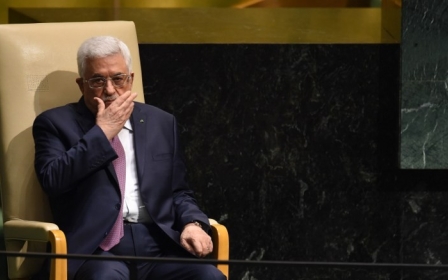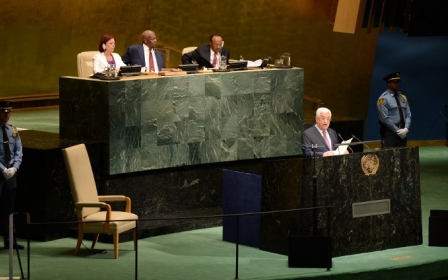New PA proposal is nothing to write home about
The Palestinian leadership appears to think that its constituents share the leadership’s own dismal situation as hostages to the Israeli occupation

Palestinian Authority President Mahmoud Abbas (AA)
Published date: 13 February 2015 01:45 GMT
|
Last update: 9 years 9 months ago
To read the coverage over the past ten days of Palestinian Authority President Mahmoud Abbas’s speech to the UN, you’d think he got up on the podium and uttered just one word: genocide. The ensuing avalanche of commentary – whether the occupation is better than a genocide, worse than a genocide or more complex than a genocide - all but buried the rest of Abbas’s speech, including the new post-Oslo, post-American-mediation strategy that was supposed to be the centrepiece of the address.
Which is all the better for Abbas, because now that the cloud of dust around this one word has started to set, Abbas is now offering a compromise - on behalf of all Palestinians – that is certainly nothing to write home about.
The core of Abbas’s new approach is a seeking a new UN Security Council resolution which will not only denounce the occupation but, will present Israel with a deadline by which it must vacate its presence from the occupied Palestinian territories. However courteous Abbas was towards the Americans in the speech, this amounts to the Palestinian leadership renouncing any illusions it might have had regarding US mediation. It also means that the Oslo Process is as dead as the proverbial parrot in the Monty Python sketch.
As soon as you begin to ponder the practicalities, however, the new path quickly begins to resemble a u-turn: switching from the mediator who wouldn’t to the mediator who can’t.
Even assuming the US does not veto the resolution Abbas is proposing (as of today, a practically unthinkable scenario), without outright American backup, the UN has no means of pressuring Israel into endorsing it. Israel-Palestine has been the subject of a spectacular 189 Security Council Resolutions since the Six Day War of 1967. With the exception of resolutions that were realised, almost as an afterthought, because they overlapped with Israeli interests (ceasefires, for instance), none were acted upon to the letter. In other words, even if the resolution was adopted; and even if Israel agreed to it; it would probably do its best to turn the stipulations of the resolution to its advantage and to make it as void of meaning as possible.
Still, it’s would be uncharitable to assume that a politician of Abbas’s calibre still harbours any illusions concerning the likelihood of the scenario he is proposing ever truly coming into play. The game he is playing is a longer one - slowly and meticulously ticking the boxes to formal recognition of Palestine’s statehood, gradually but inevitably approaching fields where some form of enforcement is at least conceivable - such as the International Criminal Court.
Here the problem lies with the very formality and measure of Abbas’s approach. Every step, however symbolic and formal it may be, is answered with new Israeli land appropriation. Every year, Israeli public opinion crawls further and further to the right, while the Green Line separating Israel proper and the occupied territories fades further and further into irrelevance - at least for the Israelis. By the time any of Abbas’s steps bear fruit, there will be little ground to implement them and no domestic constituency to which an Israeli leadership might cater by responding to the outside pressure.
There is one redeeming aspect of Abbas’ plan - or rather, a fortuitous set of circumstances. It is true that there is a slow but unmistakably growing revulsion and impatience with the occupation among policy circles and private sectors abroad, especially in Israel’s most vital trading partner - Europe. These trends owe nothing to the UN or to Abbas, and he does little - so far - to cultivate them outright. One possible explanation for this reluctance is that whatever he says or does about American patronage, Abbas still recognises the UN Security Council as very much an American pitch. Conversely, switching over completely to the EU arena would go a lot further in distancing the Palestinian Authority from US patronage. Considering the vast dependency of the PA on American aid and the fact of the PA owing its very existence to an American-sponsored peace process, it may well be that this is a step Abbas is not yet willing to take.
And the existence of the PA is indeed the very crux of the matter. If you approach a Palestinian Authority official of any seniority these days and ask them about the peace process, they will treat you to a long and eminently convincing breakdown of why the peace process is out cold, and why it is necessary to switch tactics as soon as they possibly can. But ask them if this change will include the disposal of Oslo’s mainstay - the Palestinian Authority itself - and they clam up.
The more junior among them will then admit it can indeed be said that the Palestinian Authority has become little more than a subcontractor for the Israeli occupation. But, they will say, it’s a temporary state of affairs; whatever its shortcomings, the PA still achieved more well-being and international legitimacy for the Palestinian cause than the armed struggle; and regardless of either of those factors, the fact is that the PA is the largest employer in the occupied territories - tens of thousands would lose their jobs, including thousands upon thousands of well-armed and easily disgruntled security personnel. The day after, they explain, will look like Iraq after the dismantling of the Ba’ath regime meets Al-Aqsa Intifada, and then some. Surely, chaos and bloodshed is one thing of which the Palestinian people had enough.
Putting aside the fact that this “temporary” situation has clocked two decades instead of the five years it was meant to last, this standard riposte relies too heavily on false dichotomy. The choice is not between subservience and armed struggle - neither of which, whatever the sacrifices, appear to have moved Israelis to significant concessions as of yet - but between an array of instruments: freedom rides, BDS, non-violent protests, political art and so forth.
What’s more, the Palestinian leadership appears to think that its constituents share the leadership’s own dismal situation as hostages to the Israeli occupation. This isn’t to say that the dismantling of the PA’s surrogate economy won’t be a difficult and challenging step to take - but it should go without saying the Palestinian national struggle survived cataclysms of much greater magnitude. It does not seem cavalier to assume that the Palestinian identity and the Palestinian body politic will survive the Palestinian Authority. The only question is when and on whose terms the Authority will vacate the scene in favour of new political enterprises.
New MEE newsletter: Jerusalem Dispatch
Sign up to get the latest insights and analysis on Israel-Palestine, alongside Turkey Unpacked and other MEE newsletters
Middle East Eye delivers independent and unrivalled coverage and analysis of the Middle East, North Africa and beyond. To learn more about republishing this content and the associated fees, please fill out this form. More about MEE can be found here.




